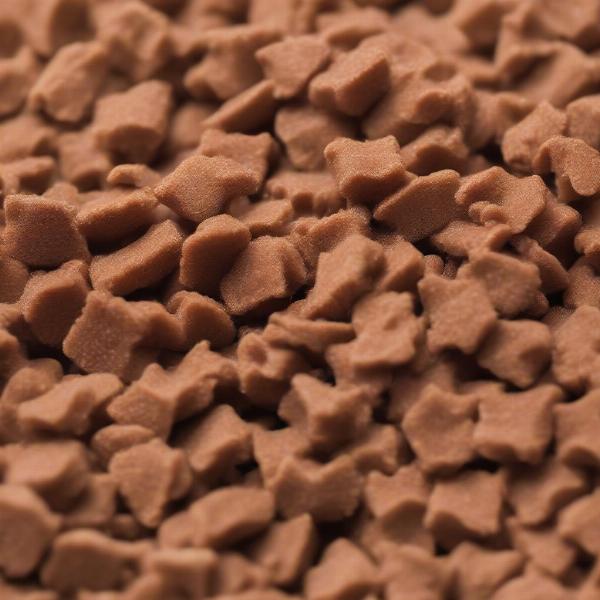Finding the best dog food for your Boxer can feel overwhelming with so many options available. This energetic and playful breed needs a specific diet to support their active lifestyle and prevent potential health issues like bloat and heart conditions. Choosing the right food is essential for your Boxer’s overall health, energy levels, and longevity. This article will guide you through selecting the perfect food for your Boxer companion, whether you have a bouncy puppy or a distinguished senior.
Nutritional Needs of a Boxer
Boxers are a large, muscular breed and require a diet rich in high-quality protein to support muscle development and maintenance. Look for dog food with animal-based protein sources, such as chicken, beef, lamb, or fish, listed as the first ingredient. Healthy fats are also important for energy, skin and coat health, and cognitive function. Sources like fish oil (rich in Omega-3 fatty acids) and chicken fat are excellent choices.
Avoiding Common Boxer Health Issues Through Diet
Boxers are prone to certain health conditions, such as bloat (gastric dilatation-volvulus), hip dysplasia, and heart problems. Choosing a food that addresses these concerns can help mitigate risks. For example, a diet formulated for large breeds often includes ingredients to support joint health, like glucosamine and chondroitin. To minimize the risk of bloat, opt for foods with moderate fat content and avoid feeding large meals at once.
 Close-up of dog food kibble with healthy ingredients.
Close-up of dog food kibble with healthy ingredients.
Best Dog Food Types for Boxers
Several types of dog food are suitable for Boxers, including dry kibble, wet food, and raw diets. Dry kibble is a popular choice due to its convenience and affordability. It also helps maintain dental health by scraping away plaque and tartar. Wet food is a palatable option that can be beneficial for picky eaters or dogs with dental issues. Raw diets have gained popularity, but it’s crucial to consult with a veterinarian to ensure nutritional balance and minimize potential health risks.
Dry Kibble: A Convenient and Cost-Effective Choice
Dry kibble is a great option for most Boxers. It’s readily available, easy to store, and helps clean their teeth. Look for a formula specifically designed for large breeds, with a protein content of around 25-30%.
Choosing the Right Food for Your Boxer’s Life Stage
A Boxer’s nutritional needs change throughout its life. Puppies require a higher calorie and protein diet to support rapid growth, while senior dogs benefit from a lower calorie formula with increased joint support. Always choose a food formulated for your Boxer’s specific life stage.
Puppy Food: Fueling Growth and Development
Boxer puppies are bundles of energy and need a diet that can keep up. Puppy food is designed to provide the extra calories and nutrients required for healthy bone and muscle development.
Senior Dog Food: Supporting Healthy Aging
As your Boxer enters its senior years, its metabolism slows down, and its nutritional needs shift. Senior dog food typically contains fewer calories to help maintain a healthy weight and ingredients like glucosamine and chondroitin to support joint health.
Reading Dog Food Labels: Deciphering the Ingredients
Learning to read dog food labels is essential for making informed decisions. Pay attention to the ingredient list, guaranteed analysis, and AAFCO statement. The ingredient list is ordered by weight, so the first few ingredients are the most prominent in the food. Look for whole meat sources, healthy fats, and avoid artificial colors, flavors, and preservatives.
Conclusion
Choosing the best dog food for your Boxer requires careful consideration of their breed-specific needs, life stage, and potential health concerns. By understanding their nutritional requirements and learning how to interpret dog food labels, you can provide your Boxer companion with the optimal diet for a long, healthy, and happy life. Remember to consult your veterinarian for personalized recommendations based on your Boxer’s individual needs.
FAQ
-
What is the best protein source for a Boxer? High-quality animal-based proteins like chicken, beef, lamb, and fish are excellent choices.
-
How much should I feed my Boxer puppy? Follow the feeding guidelines on the puppy food packaging and consult your vet for personalized recommendations.
-
Can I feed my Boxer a raw diet? Consult your veterinarian before starting a raw diet to ensure it’s nutritionally balanced and safe.
-
What are the signs of food allergies in Boxers? Common signs include itchy skin, digestive issues, and ear infections.
-
How often should I change my Boxer’s food? Sudden changes can cause digestive upset, so introduce new foods gradually.
-
Is grain-free dog food good for Boxers? There’s no definitive answer, and the best approach depends on your individual dog’s needs and sensitivities. Consult with your vet.
-
What should I do if my Boxer is a picky eater? Try mixing a small amount of wet food with their kibble or warming their food slightly.
breeds of dogs with underbites
ILM Dog is a leading international website dedicated to providing expert advice on dog care and nutrition. We offer valuable resources on breed selection, health, training, nutrition, grooming, and much more. Whether you are a seasoned dog owner or just starting your journey with a canine companion, ILM Dog is your trusted source for reliable, practical information to help you provide the best possible care for your furry friend. Contact us at [email protected] or +44 20-3965-8624 for expert advice.